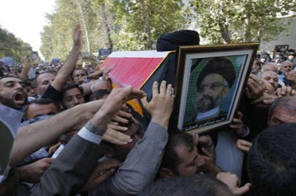Khamenei hails fight against Saddam
BAGHDAD: Iranian supreme leader Ayatollah Ali Khamenei praised leading Iraqi Shiite politician Abdel Aziz al-Hakim as the symbol of the struggle against Saddam Hussein's regime on Thursday as Iranians mourned his death.
"His death is a big loss for the Iraqi people and government, and is a painful incident for the Islamic Republic (of Iran)," said Khamenei, in a message read at a ceremony in Tehran where Hakim died in hospital on Wednesday.
The Iraqi cleric, who was one of the principal leaders in exile of the opposition to Saddam's regime which mounted a devastating 1980-88 war against Iran, died of lung cancer after a 28-month battle.
"He symbolised the hardship involved in jihad in fighting tyranny," said Khamenei as hundreds of Iranians gathered at the Iraqi embassy to mourn.
"The efforts and endeavour of this hardworking cleric are unique and unforgettable both in Iraq and Iran.
"I pay my condolences to the Iraqi government, Hakim's family and especially Ammar Hakim," he added, referring to Hakim's elder son, who has said he is prepared to take on his father's mantle.
In Damascus, Syrian President Bashar al-Assad expressed his "sincere condolences and sympathy" to his Iraqi counterpart, Jalal Talabani, and to the people of the country.
Syria and Iraq are currently engaged in a diplomatic spat, with Baghdad insisting Syria is harbouring insurgents responsible for deadly recent bombings in the Iraqi capital. Damascus denies those charges.
In Iraq, top Shiite cleric Grand Ayatollah Ali al-Sistani was deeply saddened by Hakim's death, his office in the central shrine city of Najaf said.
"In deep sadness, Ali al-Sistani received the news of the death of his eminence scholar Abdel Aziz al-Hakim, who passed away after a life full of giving for the sake of his religion and country, and to save his people from despotism and injustice," Sistani's office said.
Leading Iranian officials such as parliament speaker Ali Larijani and Foreign Minister Manouchehr Mottaki were present at the ceremony in Tehran.
"He had an admirable devotion and deference to the supreme leader Ayatollah Khamenei," said Larijani, dressed in black, in an address to the mourners.
"We hope his sacred way continues more powerfully and we will witness our brother's increasingly effective role on the scene."
The coffin carrying Hakim's body was wrapped in the Iraqi flag and borne by pallbearers a short distance from the embassy in tribute.
"Death to America. Death to Israel," the mourners chanted.
The body was to be taken to Iran's Shiite clerical capital of Qom later Thursday before being flown to Baghdad on Friday.
From Baghdad airport the body will be taken to the mausoleum of Imam Kadhim in the Kadhimiyah shrine district of the Iraqi capital.
It will later be taken to an official mourning ceremony in Baghdad's heavily fortified Green Zone, the seat of the Iraqi government and the US embassy.
After the ceremony in the Green Zone, the body will be taken to the Shiite shrine city of Karbala and on Saturday it will be buried in Najaf.
Iranian President Mahmoud Ahmadinejad called Hakim's death "a great loss for the Iraqi people," and paid particular tribute to his family, describing them as "revolutionaries," the official IRNA news agency reported.
In 1982, Hakim helped to establish an opposition movement in exile in Iran to battle Saddam's Sunni-dominated regime, and returned to Iraq after the US-led invasion of 2003.
His Supreme Iraqi Islamic Council (SIIC) swept Shiite areas in the first provincial elections after the invasion, but in new elections this January the party suffered major losses.
A former chain smoker, Hakim was admitted to a Tehran hospital on Saturday following complications.
"The advanced stage of cancer had damaged his liver, brain and bones and because of that he died," said a doctor at the Masih Daneshvari hospital.
Hakim had been in Tehran for treatment for more than four months and also visited the United States in the past to consult lung cancer specialists.






